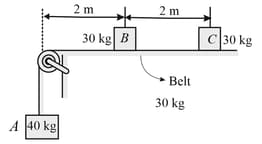BM Sharma Solutions for Chapter: Newton's Laws of Motion II, Exercise 5: DPP
BM Sharma Physics Solutions for Exercise - BM Sharma Solutions for Chapter: Newton's Laws of Motion II, Exercise 5: DPP
Attempt the free practice questions on Chapter 7: Newton's Laws of Motion II, Exercise 5: DPP with hints and solutions to strengthen your understanding. Chapterwise/Topicwise Daily Practice Problems (DPP) Mechanics I JEE Main & Advanced solutions are prepared by Experienced Embibe Experts.
Questions from BM Sharma Solutions for Chapter: Newton's Laws of Motion II, Exercise 5: DPP with Hints & Solutions
In the given diagram, what is the minimum value of a horizontal external force on the block so that block will slide on the ground?
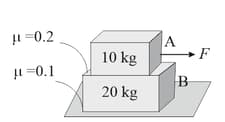
Two blocks and are connected by a string passing over a smooth pulley as shown in the figure. rests on a rough horizontal surface and rests on . The coefficient of friction between and is the same as that between and the horizontal surface. The minimum horizontal force required to move to the left is The coefficient of friction is

In which of the following cases the friction force between and is maximum? In all cases
In the situation shown in the figure, a wedge of mass is placed on a rough surface, on which a block of equal mass is placed on the inclined plane of wedge. Friction coefficient between plane and the block and the ground and the wedge . An external force is applied horizontally on the wedge. Given that does not slide on incline due to its weight. The value of at which wedge will start slipping is
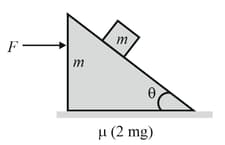
The value of at which no friction will act on block on a inclined plane is
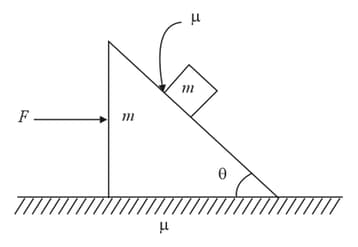
The coefficient of friction between block and wedge is , then, find out the minimum value of acceleration of wedge for which the block starts sliding on the wedge?
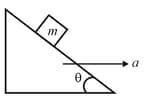
All the blocks shown in the figure are at rest. The pulley is smooth and the strings are light. The coefficient of friction at all the contacts is . A frictional force of acts between and . The block is about to slide on block . The normal reaction exerted by the ground on the block is
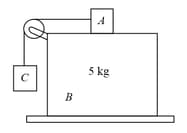
Two blocks rest on a massless belt which passes over a fixed pulley and is attached to a block. If the coefficient of friction between the belt and the table as well as between the belt and the blocks and is and the system is released from rest from the position shown, the speed with which the block falls off the belt is
